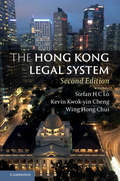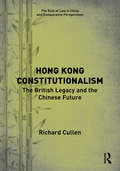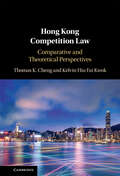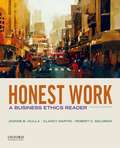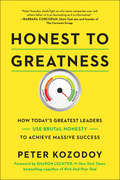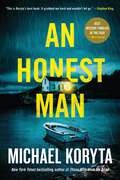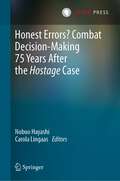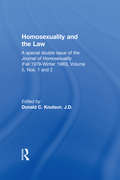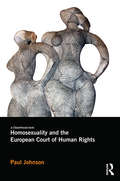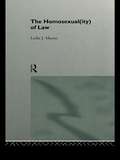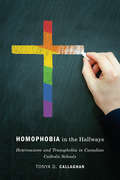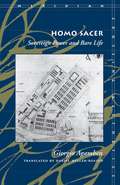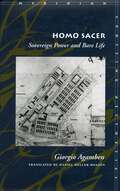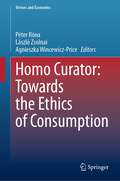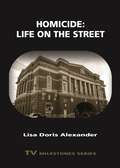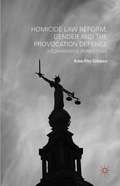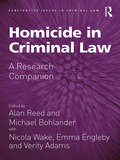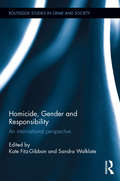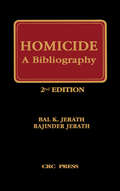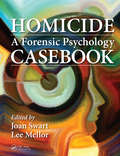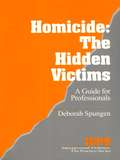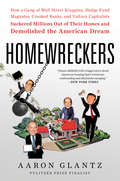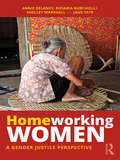- Table View
- List View
Hong Kong's Court of Final Appeal
by Simon N. M. Young Yash GhaiIn the years since it was established on 1 July 1997, Hong Kong's Court of Final Appeal has developed a distinctive body of new law and doctrine with the help of eminent foreign common law judges. Under the leadership of Chief Justice Andrew Li, it has also remained independent under Chinese sovereignty and become a model for other Asian final courts working to maintain the rule of law, judicial independence and professionalism in challenging political environments. In this book, leading practitioners, jurists and academics examine the Court's history, operation and jurisprudence, and provide a comparative analysis with European courts and China's other autonomous final court in Macau. It also makes use of extensive empirical data compiled from the jurisprudence to illuminate the Court's decision-making processes and identify the relative impacts of the foreign and local judges.
The Hong Kong Legal System
by Stefan H. Lo Kevin Kwok-yin Cheng Wing Hong ChuiThis book provides an introduction to the legal system in Hong Kong. Understanding Hong Kong's legal system today requires both an understanding of the British origins of much of the laws and legal institutions as well as the uniquely Hong Kong developments in the application of the Basic Law under 'one country, two systems'. These features of the Hong Kong legal system are explored in this book, which takes into account developments in the two decades or so of the new legal framework in Hong Kong since the 1997 handover. In providing both an exposition of the legal institutions in Hong Kong and legal method under Hong Kong's legal system (including practical guidance and examples on case law, statutory interpretation and legal research), this book is ideal for first-year law students, students of other disciplines who study law and readers who have an interest in Hong Kong's unique legal system.
Hong Kong Constitutionalism: The British Legacy and the Chinese Future (The Rule of Law in China and Comparative Perspectives)
by Richard CullenHong Kong is widely regarded as an exemplar of authoritarian jurisdictions with a positive history of adhering to Rule of Law–shaped governance systems. British Hong Kong provides a remarkable story of the effective development and consolidation of such a system, which has continued to apply since 1997, when it became the Hong Kong Special Administrative Region (HKSAR) within the People’s Republic of China (PRC). This book adopts a fresh approach in examining the evolution of Hong Kong’s political-legal experience. It establishes that these prominent governance achievements were built on particular British constitutional foundations forged over many centuries. The work shows how the analysis of the British theorist Albert Dicey and, in particular, “Diceyan Constitutionalism” was fundamental, within the pivotal context of “Chinese Familism”, in shaping the development of governance institutions and operational procedures within the new British Colony. It discusses how Hong Kong’s system of Authoritarian Legality has come to pass. Exploring the essence of that system, the study probes how thoroughly it has been stress-tested, not least in 2019, and how well it may be placed to cope with tests yet to come. It also analyzes Hong Kong–Beijing relations and the long-term prospects for the HKSAR within the PRC based on a balanced contemporary assessment of China’s exceptional One Party State.
Hong Kong Competition Law: Comparative and Theoretical Perspectives
by Thomas K. Cheng Kelvin Hiu KwokThis is the first academic monograph on the new competition law in Hong Kong. It provides an overview of the historical background of the Competition Ordinance, highlighting the debate and the process that led to the adoption of the Ordinance. It offers detailed comparative and theoretical analysis of the key provisions of the Ordinance, focusing on the First Conduct Rule, the Second Conduct Rule, the exclusions and exemptions, and the procedural provisions. It draws on overseas legislation and jurisprudence that inspired the provisions in the Ordinance and incorporates a detailed examination of the latest cases decided by the Competition Tribunal. It engages in relevant academic debates and theoretical analysis of how competition law in Hong Kong should develop in light of its unique economic and political contexts. It concludes by setting forth of a set of recommendations for further reform.
Honest Work: A Business Ethics Reader
by Joanne B. Ciulla Clancy Martin Robert C. SolomonIn today's business world, ethics is not simply a peripheral concern of executive boards or a set of supposed constraints on free enterprise. Ethics stands at the very core of our working lives and of society as a whole, defining the public image of the business community and the ways in which individual companies and people behave. What people do at work--and how they think about work--determines their attitudes and aspirations, affecting and even structuring their personal lives and habits. <P><P>Working from this premise, Honest Work: A Business Ethics Reader provides a practical overview of business ethics that concentrates on the ethical problems and dilemmas students are most likely to face in their prospective work environments. Classic and recent articles and cases cover a broad spectrum of issues and concerns--from private ethical dilemmas to larger considerations of corporate values--and propose guidelines for thinking about the business world in a moral context. Each reading and case is followed by lively questions for discussion. <P><P>Offering a welcome alternative to the impersonal tone of most business ethics texts, the editors address students in an appealing and conversational manner. They provide engaging chapter introductions that include personal narratives and also present the ideas of great philosophers in a unique way--as emails. <P><P>Ideal for introductory undergraduate and MBA courses in business ethics, Honest Work: A Business Ethics Reader can be read as a coherent narrative but also offers instructors great flexibility, as its various chapters, readings, and cases can be pursued in almost any order. A Companion Website featuring chapter objectives and summaries, study questions, self-tests, and off-site links of interest will soon be available. An Instructor's Manual with Test Bank is available to adopters.
Honest to Greatness: How Today's Greatest Leaders Use Brutal Honesty to Achieve Massive Success
by Peter KozodoyIn today's hyper-transparent world, consumers have enormous power to decide which brands are worth their time and money—so how do you make sure they choose yours? Unfortunately, most leaders and organizations are stuck following archaic, detrimental business practices. Meanwhile, savvy consumers and employees across every generation are making their stance perfectly clear: They are not interested in supporting organizations that seem inauthentic, soulless, or untrustworthy. In this environment, only the honest will survive. In Honest to Greatness, serial Inc. 5000 entrepreneur Peter Kozodoy shows how today's greatest business leaders use honesty—not as a touchy-feely core value, but as a business strategy that produces game-changing, industry-dominating success. Through case studies and interviews with leaders at Bridgewater Associates, Sprint, Quicken Loans, Domino's, The Ritz-Carlton, and more, Kozodoy presents fresh business concepts that anyone in the workplace can implement in order to: • Reach, engage, and retain your best customers • Attract and inspire the best talent in any industry • Create an unbeatable culture of innovation that dominates your competitors • Earn your team's respect and loyalty • Unlock deep personal fulfillment by setting the "right" goals Filled with powerful lessons for current and future leaders, this timely book demonstrates how to use honesty at both the organizational and individual level to achieve true greatness in business and in life.
An Honest Man: A Novel
by Michael KorytaIn this breathtaking thriller from the New York Times bestselling author of Those Who Wish Me Dead, the murder of several politicians at sea shatters the world of a local lobsterman who must prove his innocence and save his own life.Israel Pike was a killer, and he was an honest man. They were not mutually exclusive. After discovering seven men murdered aboard their yacht – including two Senate rivals – Israel Pike is regarded as a prime suspect. A troubled man infamous on Salvation Point Island for killing his own father a decade before, Israel has few options, no friends, and a life-threatening secret. Elsewhere on the island, 12-year-old Lyman Rankin seeks shelter from his alcoholic father in an abandoned house only to discover that he is not alone. A mysterious woman greets him with a hatchet and a promise: &“Make a sound and I&’ll kill you.&” As the investigation barrels forward, Lyman, Israel, and the fate of the case collide in immutable ways. Written with mounting suspense, stirring emotion, and deep understanding of character, Koryta continues to prove why David Baldacci has called him &“an exceptionally gifted storyteller&” and Michael Connelly has deemed him &“one of the best of the best, plain and simple.&”
Honest Errors? Combat Decision-Making 75 Years After the Hostage Case
by Nobuo Hayashi Carola LingaasThis book marks the 75th anniversary of the 1948 Hostage Case in which a US military tribunal in Nuremberg acquitted General Lothar Rendulic of devastating Northern Norway on account of his honest factual error. The volume critically reappraises the law and facts underlying his trial, the no second-guessing rule in customary international humanitarian law (IHL) that is named after the general himself, and the assessment of modern battlefield decisions.Using recently discovered documents, this volume casts major doubts on Rendulic’s claim that he considered the region’s total devastation and the forcible evacuation of all of its inhabitants imperatively demanded by military necessity at the time. This book’s analysis of court records reveals how the tribunal failed to examine relevant facts or explain the Rendulic Rule’s legal origin. This anthology shows that, despite the Hostage Case’s ambiguity and occasional suggestions to the contrary, objective reasonableness forms part of the reasonable commander test under IHL and the mistake of fact defence under international criminal law (ICL) to which the rule has given rise. This collection also identifies modern warfare’s characteristics—human judgment, de-empathetic battlespace, and institutional bias—that may make it problematic to deem some errors both honest and reasonable. The Rendulic Rule embodies an otherwise firmly established admonition against judging contentious battlefield decisions with hindsight. Nevertheless, it was born of a factually ill-suited case and continues to raise significant legal as well as ethical challenges today.The most comprehensive study of the Rendulic Rule ever to appear in English, this multi-disciplinary anthology will appeal to researchers and practitioners of IHL and ICL, as well as military historians and military ethicists and offers ground-breaking new research.Nobuo Hayashi is affiliated to the Centre for International and Operational Law at the Swedish Defence University in Stockholm, Sweden.Carola Lingaas is affiliated to the Faculty of Social Studies at VID Specialized University in Oslo, Norway.
Homosexuality and the Law
by Donald C. Knutson, J.D.A fascinating exploration of how the law--as viewed and decided by the courts--often embodies fear and prejudice against homosexuality, and thereby, becomes the instrument for discrimination. This valuable book covers a wide range of subjects, illustrating the extent to which the lives of gay persons are touched by these laws and providing a highly critical examination of the response by the American judicial system to our claims for equal protection under the law. Leading law professors and practicing lawyers address the important legal issues and court decisions relevant to male and female homosexuality--criminal punishment for gay sex acts, employment discrimination, child custody, gay organizational rights, and more.
Homosexuality and the European Court of Human Rights
by Paul JohnsonHomosexuality and the European Court of Human Rights is the first book-length study of the Court’s jurisprudence in respect of sexual orientation. It offers a socio-legal analysis of the substantial number of decisions and judgments of the Strasbourg organs on the wide range of complaints brought by gay men and lesbians under the European Convention on Human Rights. Providing a systematic analysis of Strasbourg case law since 1955 and examining decades of decisions that have hitherto remained obscure, the book considers the evolution of the Court’s interpretation of the Convention and how this has fashioned lesbian and gay rights in Europe. Going beyond doctrinal analysis by employing a nuanced sociological consideration of Strasbourg jurisprudence, Paul Johnson shows how the Court is a site at which homosexuality is both socially constructed and regulated. He argues that although the Convention is conceived as a ‘living instrument’ to be interpreted ‘in the light of present-day conditions’ the Court’s judgments have frequently forged and advanced new social conditions in respect of homosexuality. Johnson argues that the Court’s jurisprudence has an extra-legal importance because it provides an authoritative and powerful discursive resource that can be mobilized by lesbians and gay men to challenge homophobic and heteronormative social relations in contemporary societies. As such, the book considers how the Court’s interpretation of the Convention might be evolved in the future to better protect lesbian and gay rights and lives.
The Homosexual(ity) of law
by Leslie MoranFirst published in 1996. Routledge is an imprint of Taylor & Francis, an informa company.
Homophobia in the Hallways: Heterosexism and Transphobia in Canadian Catholic Schools
by Tonya D. CallaghanSection 15 of the Canadian Charter of Rights and Freedoms ensures equality regarding sexual orientation and gender identity in Canada. Despite this, gay, lesbian, and gender-nonconforming teachers in publicly-funded Catholic schools in Ontario and Alberta are being fired for living lives that Church leaders claim run contrary to Catholic doctrine about non-heterosexuality; meanwhile, requests from students to establish Gay/Straight Alliances are often denied. In Homophobia in the Hallways, Tonya D. Callaghan interrogates institutionalized homophobia and transphobia in the publicly-funded Catholic school systems of Ontario and Alberta. Featuring twenty interviews with students and teachers who have faced overt discrimination in Catholic schools, the book blends theoretical inquiry and real-world case study, making Callaghan’s study a unique insight into religiously-inspired heterosexism and genderism. She uncovers the causes and effects of the long-standing disconnect between Canadian Catholic schools and the Charter by comparing the treatment of and attitudes towards lesbian, gay, bisexual, transgender and queer teachers and students in these publicly-funded systems.
Homo Sacer: Sovereign Power and Bare Life
by Giorgio AgambenThe author in this book aims to connect the problem of pure possibility, potentiality, and power with the problem of political and social ethics in a context where the latter has lost its previous religious, metaphysical, and cultural grounding.
Homo Sacer: Sovereign Power and Bare Life (Meridian: Crossing Aesthetics)
by Giorgio AgambenIn this major work by the renowned Italian philosopher, an obscure figure in Roman law poses significant questions about the nature of power.The work of Giorgio Agamben, one of Italy’s most important and original philosophers, challenges modern conceptions of society and the individual’s place within it. In Homo Sacer, Agamben aims to connect the problem of pure possibility, potentiality, and power with the problem of political and social ethics in a time when they have lost their fundamental religious, metaphysical, and cultural grounding. Taking his cue from Foucault, Agamben probes the covert presence of biopolitics in the history of traditional political theory. He argues that Wester thought on politics has always featured an implicit notion of sovereignty as power over “life”. The reason it remains merely implicit has to do, according to Agamben, with the way the sacred becomes indissociable from the idea of sovereignty. Agamben draws on Carl Schmitt’s conception of sovereign status, as well as anthropological research revealing the link between the sacred and the taboo, Agamben defines the sacred person as one who can be killed and yet not sacrificed. He demonstrates how this paradox operates in the status of the modern individual living in a system that exerts control over the collective “naked life” of all individuals.
Homo Curator: Towards the Ethics of Consumption (Virtues and Economics #8)
by Péter Róna László Zsolnai Agnieszka Wincewicz-PriceThis book explores the under-researched sources of the consumerist culture and the environmental damage it has brought about. The book is an outcome of the symposium on “The Ethics of Consumption” organised and hosted by the Las Casas Institute at the Blackfriars Hall, University of Oxford as part of its Economics as a Moral Science Programme. It takes on two contemporary problems: the human weakness and capacity for wrong-doing, and the failure of modern economic theory to account for the moral character of human behaviour and its implicit encouragement of gluttonous life-styles. In a time when grand political schemes are proposed to revive sustainability of global economy, the authors of the papers collected in this book highlight the need for moral renewal without which the most revolutionary structural reforms are bound to fail at producing the desired outcome. Topics of the book include the meaning and sources of avarice, the attempt to define what is enough, exploration of philosophical and theological perspectives which can serve as building blocks for the ethics of consumption. This makes the book of great interest to a broad readership of economists, social scientists and philosophers.
Homicide: Life on the Street (TV Milestones Series)
by Lisa Doris AlexanderRenowned for its unique visual style, Homicide: Life on the Street fundamentally changed the police procedural genre. The show broke records, featured memorable characters, and launched careers--most notably that of David Simon, whose own nonfiction book, Homicide: A Year on the Killing Streets, inspired the series, and who went on to create both The Wire and Treme. Homicide was an anomaly in the 1990s for its honest and open portrayals and discussions of race, and in this TV Milestone, Lisa Doris Alexander uses Critical Race Theory as a lens to highlight how the show illustrated the impacts that racial politics can have on policing. Homicide is one in a long line of police procedurals that date back to the early days of broadcast television, with series such as Dragnet (NBC 1951–59), Hawaii Five-O (CBS 1968–80), and Columbo (NBC 1971–78). But because Homicide takes place and was filmed in the majority-Black city of Baltimore, it makes sense that many of the main and supporting cast are Black. This differentiated it from the other shows of its genre and time. Chapter 1 discusses the Black-starring roles on Homicide in terms of being non-stereotypical and both written and performed as well-rounded, complex characters. Chapter 2 focuses on issues of race and racism and their impact on policing. Chapter 3 looks at other power dynamics, such as class, political clout, and social standing, and how those dynamics intersect with race and the criminal justice system’s perceived neutrality. In many regards, Homicide was ahead of its time. Alexander argues that Homicide reflects the politics of the Black Lives Matter movement, which in turn highlights the fact that the issues brought up by the movement are long-standing and that the series affirms the critiques BLM activists make about the criminal justice system. This book shows that the series’ oftentimes unflinching commentary on the systemic flaws within the criminal justice system not only feels more at home in today’s television and political landscape than it did in the 1990s but is just as relevant. Fans of the works of David Simon, as well as students and scholars of television studies and Critical Race Theory, will enjoy this enlightening book.
Homicide Law Reform, Gender and the Provocation Defence
by Kate Fitz-GibbonThis book critically examines the operation of the partial defence of provocation in a range of comparative international jurisdictions. Centrally concerned with conceptual questions of gender, justice and the role of denial in the criminal justice system, Fitz-Gibbon explores the divergent approaches taken to reforming the law of provocation.
Homicide in Criminal Law: A Research Companion (Substantive Issues in Criminal Law)
by Alan Reed Michael BohlanderThis volume presents a leading contribution to the substantive arena relating to homicide in the criminal law. In broad terms, the ambit of homicide standardisations in extant law is contestable and opaque. This book provides a logical template to focus the debate. The overall concept addresses three specific elements within this arena, embracing an overarching synergy between them. This edifice engages in an examination of UK provisions, and in contrasting these provisions against alternative domestic jurisdictions as well as comparative contributions addressing a particularised research grid for content. The comparative chapters provide a wider background of how other legal systems treat a variety of specialised issues relating to homicide in the context of the criminal law. The debate in relation to homicide continues apace for academics, practitioners and within the criminal justice system. Having expert descriptions of the wider issues surrounding the particular discussion and of other legal systems’ approaches serves to stimulate and inform that debate. This collection will be a major source of reference for future discussion.
Homicide, Gender and Responsibility: An International Perspective (Routledge Studies in Crime and Society)
by Kate Fitz-Gibbon Sandra WalklateThe crime of homicide has long animated academic debate, community concern and political attention. The discussion has often centered on the perceived (in)adequacy of legal responses to homicide, questions of culpability, and divergent representations of victims and offenders. Within this, notions of gender, responsibility and justice are pivotal. This edited collection builds on existing scholarship by examining these concerns not only in the context of the ‘private’ world of domestic murder but also in the more ‘public’ world of the state, the corporation, war, and genocide. In so doing this book draws from key frameworks of criminological thought, legal analysis and empirical evidence to critically examine the relationship between homicide, gender and responsibility. Bringing together leading international criminology and legal scholars, this collection provides a unique contribution to the academic and policy engagement with what is, more often than not, an ordinary and mundane crime. Analysing the crime in a variety of different social contexts alongside an in-depth and critical analysis of the interconnections between the ordinary act of lethal violence, gender and notions of responsibility, this book will be of interest to students, scholars and policymakers working in criminology and socio-legal studies.
Homicide: A Bibliography, Second Edition
by Bal K. Jerath Rajinder JerathHomicide represents the result of an exhaustive search of the world literature regarding homicide. More than 7,000 entries have been compiled from references selected from major indexes in libraries from outstanding universities, government agencies, and military posts; science libraries; law libraries; and the Library of Congress. Each entry features a one- or two-word annotation that indicates whether it is an article or a book, and all entries conform to the American Psychological Association stylebook guidelines. Key-word and author indexes provide quick access to works pertaining to particular subjects or by a certain author.
Homicide: A Forensic Psychology Casebook
by Joan Swart and Lee MellorForensic psychology plays an increasingly important role in criminal investigations and legal decision-making. Homicide: A Forensic Psychology Casebook guides readers through the practical aspects of homicide cases across the entire criminal justice system, from the investigative process to the criminal trial process, and beyond. Each chapter contains a description and analysis of selected cases and offenders, and provides a crime narrative and offender narrative to illustrate the underlying theory and practical considerations of homicide investigations. Criminal justice students and practitioners alike will benefit from the comprehensive scope of this text. In order to ensure fair and efficient criminal justice practices in the field of forensic investigation, there is still a need for conformity and standardization of sound protocols and approaches based on improved knowledge and education. This book is part of that effort to understand homicidal behavior and offenders better in order to prevent similar crimes.
Homicide: A Guide for Professionals
by Deborah SpungenThe author of this groundbreaking volume is not only a social scientist and victim advocate; she is also the mother of a murder victim. Deborah Spungen illustrates how and why family members become co-victims when a loved one is murdered, and she poignantly addresses the emotional, physical, spiritual and psychological effects of such traumatic events. These "invisible victims" often find their wounds compounded by confusion and a sense of aloneness in the aftermath of such a tragic event. The author draws on research, personal insight and case examples to illuminate critical issues that surround: family notification of a loved one's murder, effects of murder on family and friends of the victim, media influences, traumatic grief, circumstantial influences, the criminal justice system and reconstruction and healing. The book will be invaluable for mental health practitioners and victim advocates.
Homewreckers: How a Gang of Wall Street Kingpins, Hedge Fund Magnates, Crooked Banks, and Vulture Capitalists Suckered Millions Out of Their Homes and Demolished the American Dream
by Aaron GlantzIn the spirit of Evicted, Bait and Switch, and The Big Short, a shocking, heart-wrenching investigation into America’s housing crisis and the modern-day robber barons who are making a fortune off the backs of the disenfranchised working and middle class—among them, Donald Trump and his inner circle. Two years before the housing market collapsed in 2008, Donald Trump looked forward to a crash: “I sort of hope that happens because then people like me would go in and buy,” he said. But our future president wasn’t alone. While millions of Americans suffered financial loss, tycoons pounced to heartlessly seize thousands of homes—their profiteering made even easier because, as prize-winning investigative reporter Aaron Glantz reveals in Homewreckers, they often used taxpayer money—and the Obama administration’s promise to cover their losses. In Homewreckers, Glantz recounts the transformation of straightforward lending into a morass of slivered and combined mortgage “products” that could be bought and sold, accompanied by a shift in priorities and a loosening of regulations and laws that made it good business to lend money to those who wouldn’t be able to repay. Among the men who laughed their way to the bank: Trump cabinet members Steve Mnuchin and Wilbur Ross, Trump pal and confidant Tom Barrack, and billionaire Republican cash cow Steve Schwarzman. Homewreckers also brilliantly weaves together the stories of those most ravaged by the housing crisis. The result is an eye-opening expose of the greed that decimated millions and enriched a gluttonous few.
Homeworking Women: A Gender Justice Perspective
by Annie Delaney Rosaria Burchielli Shelley Marshall Jane TateHomework; work that is categorised as informal employment, performed in the home, mainly for subcontractors and mostly undertaken by women. The inequities and injustices inherent in homework conditions maintain women’s weak bargaining position, preventing them from making any improvements to their lives via their work. The best way to tackle these issues is not to abolish, but to bring equality and justice to homework. This book contributes a gender justice framework to analyse and confront the issues and problems of homework. The authors propose four justice dimensions – recognition, representation, rights and redistribution – to examine and analyse homework. This framework also takes into account the structures and processes of capitalism and the patriarchy, and the relations of domination that are widely held to be the major factors that determine homework injustice. The authors discuss strategies and approaches that have worked for homeworkers, highlighting why they worked and the features that were beneficial for them. Homeworking Women will be of interest to individuals and organisations working with or for the collective benefit of homeworkers, academics and students interested in feminism, labour regulation, informal work, supply chains and social and political justice.
The Homevoter Hypothesis: How Home Values Influence Local Government Taxation, School Finance, and Land-Use Policies
by William A. FischelJust as investors want the companies they hold equity in to do well, homeowners have a financial interest in the success of their communities. If neighborhood schools are good, if property taxes and crime rates are low, then the value of the homeowner’s principal asset—his home—will rise. Thus, as William Fischel shows, homeowners become watchful citizens of local government, not merely to improve their quality of life, but also to counteract the risk to their largest asset, a risk that cannot be diversified. Meanwhile, their vigilance promotes a municipal governance that provides services more efficiently than do the state or national government. Fischel has coined the portmanteau word “homevoter” to crystallize the connection between homeownership and political involvement. The link neatly explains several vexing puzzles, such as why displacement of local taxation by state funds reduces school quality and why local governments are more likely to be efficient providers of environmental amenities. The Homevoter Hypothesis thereby makes a strong case for decentralization of the fiscal and regulatory functions of government.

